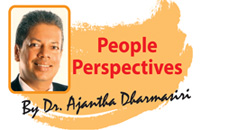Dinosaurs and dolphins as corporate creatures
 Distinct
or extinct? That is the challenge in front of us in an increasingly
competitive world. It is a fact that dinosaurs only exist in movies. It
is also a fact that dolphins are intelligent and can adapt to a changing
environment. Today's column takes a look at lessons from 'dinosaur exit'
and 'dolphin distinct' with regard to surviving and succeeding amidst a
surge of changes for better or for worse. Distinct
or extinct? That is the challenge in front of us in an increasingly
competitive world. It is a fact that dinosaurs only exist in movies. It
is also a fact that dolphins are intelligent and can adapt to a changing
environment. Today's column takes a look at lessons from 'dinosaur exit'
and 'dolphin distinct' with regard to surviving and succeeding amidst a
surge of changes for better or for worse.
Dinosaurs are a diverse group of animals that appeared approximately
230 million years ago. Scientists are of the view that all dinosaurs
became extinct around 61 million years ago which is shortly past the
Cretaceous Period.
No one really knows for sure how exactly dinosaurs became extinct but
there is much evidence showing a sudden stop as opposed to the dinosaurs
slowly dying off. With this strange mystery, there are many theories on
the possible reasons to what happened to stop the species. Some are not
very realistic as many are only suggestions, and are not backed by
proof.
Dinosaurs in the Corporate World
|

Pic source: creativeconomy.britishcouncil.org
|
There are people who resist change. It is a common factor in
corporations. Change is uncomfortable. Human nature is such that there
is resistance to move beyond comfort zones. Renowned novelist D. H.
Lawrence puts this vividly, "No one fears a new idea, what they fear is
a new experience". Telling is easy and doing is difficult.
The worst part is that the corporate dinosaurs block creative ideas.
They find hundreds of ways to say 'no' to an initiative. These 'nay
sayers' have a popular practice to kill an idea. "Yes it is a good idea,
but it will not work here". This 'yes-butting' is frustrating from the
individual point of view and is also faulty from the institutional point
of view.
Many forms of such corporate dinosaurs are seen in Sri Lankan
organizations as well.
In the case of the public sector, overly clinging on to financial and
administrative regulations in killing new ideas is a common complaint. I
have met many public administrators who say why an initiative cannot be
implemented giving so many reasons without focusing on how it can be
made implementable. This is in direct contrast to what Kumaratunga
Munidasa, our language maestro said. "A nation without innovation will
not prosper. It will lay lamenting, being unable to beg".
Dolphins
In the private sector too, we can occasionally see the presence of
dinosaurs. Those who are adamant about doing a task in the old,
traditional way, without changing for the better qualify to be in this
category. Some of them are scared of technology. They hide their
technical ignorance by proclaiming that they never use a mobile "as a
matter of principle".
Dolphins are marine mammals closely related to whales and porpoises.
They are found worldwide, mostly in the shallower seas of the
continental shelves. They are carnivores and eat mostly fish and squid.
The family of dolphins evolved relatively later, about ten million years
ago, during the Miocene era.
They are among the most intelligent animals and their friendly
appearance and seemingly playful attitude have made them popular in
human culture. Dolphins are believed to be the most intelligent of all
animals. Comparatively, a dolphin is as intelligent as a two-year-old
human.
Social behaviour of dolphins
Dolphins frequently accompany boats, riding the bow waves. They are
also famous for their willingness to occasionally approach humans and
playfully interact with them in the water. There have been reports of
dolphins protecting swimmers against sharks by swimming circles around
the swimmers.
Dolphins are social animals, which live in pods (also called
'schools') of up to a dozen animals. In places with a high abundance of
food, schools may join temporarily, forming an aggregation called a
super pod. Such groupings may be over 1,000 dolphins. They communicate
using a variety of clicks, whistles and other vocalizations. They also
use ultrasonic sounds for echolocation.
Membership in schools is not rigid and interchange is common.
However, the animals can establish strong bonds between each other. This
leads to them staying with injured or ill fellows for support.
Because of their high capacity for learning, humans have employed
dolphins for many purposes. Dolphins trained to perform in front of an
audience have become a favourite attraction, for example Sea World in
Florida, USA. Dolphin and human interaction is also employed in a
curative sense at places where dolphins work with autistic or otherwise
differently-abled children. The military has employed dolphins for
various purposes from finding mines to rescuing lost or trapped persons
Corporate dolpins
These are a preferred or perhaps badly needed and sadly missing
category of employees. They are creative and take initiatives. They work
in synergy with their colleagues, showing synergy in action. They act as
team players in driving teams to reach great heights.
They thrive on change and in fact act like champions of change.
Dynamism, flexibility and enthusiasm are visible in these managers. They
are the first to come up with creative ideas, innovative solutions and
novel practices. Like the intelligent dolphins, these corporate
creatures drive change in organizations.
They are idea generators and task implementers. In essence, they
appear as thinking performers.
They appear to be a rare breed in the Sri Lankan corporate world.
Thinking out of the box in coming forward with novel solutions to
pressing issues is what is in high demand.
Of late, increased recognition of such devoted dolphins can be seen
especially in the private sector.
The case is worse in the public sector where conformance over
creativity is the norm.
When seniority is the criteria for promotions, more talented younger
players get sidelined.
The time has come for Sri Lankan organizations to grow and glow.
Transitioning from a dinosaur mindset to a dolphin mindset is of utmost
importance. It is hoped that public administrators and business partners
act accordingly in moving towards successful and sustained achievements.
Dr. Ajantha S. Dharmasiri is the Director of the Postgraduate
Institute of Management. He also serves as an Adjunct Professor in the
Division of Management and Entrepreneurship, Price College of Business,
University of Oklahoma, USA. |

